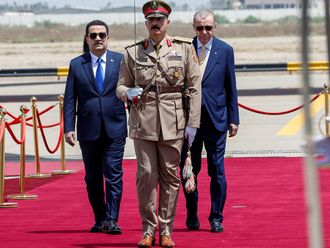Cairo: A Cairo court on Saturday approved the establishment of a political party that has been trying to secure a licence for 15 years - a ruling underlying the deep changes that have swept Egypt since its president was toppled.
The Wasat Party (Centre Party) has tried to gain an official licence four times since 1996, but each time its application was rejected by a political parties committee chaired by a leading member of the ruling party, a procedure that stifled opposition.
Each time the Wasat Party's application was rejected by the committee, the party would lodge court appeals which, until Saturday's ruling, had also met with failure.
The ruling made it the first party to gain legal status since President Hosni Mubarak was toppled on February 11 and paves the way for the Wasat Party, founded by a former member of the Muslim Brotherhood, to take part in forthcoming elections.
The military council governing Egypt has yet to abolish the political parties law used by the Mubarak administration to control political life. Saturday's court session had been scheduled before Mubarak was ousted.
"The court ruled that the party was established and legitimate as of today," Egypt's state news agency said.
Abou Elela Mady, the Wasat Party founder, broke away from the Muslim Brotherhood in the mid-1990s because of what he has described as its "narrow political horizons".
His first attempt at founding the Wasat Party landed him and others in a military court, accused of trying to set up a party as an Islamist front.
Mady drew criticism from the Brotherhood, which said he was trying to split the movement.
The Brotherhood, which is regarded with suspicion by Washington, is the biggest political group in Egypt and says it would win 30 per cent of votes in an election.
The court ruling annulled the last decision of the political parties' committee, clearing the way for the Wasat Party to start operating.
In an interview with Reuters this week, Mady likened his party's ideology to that of Turkey's ruling AK Party, which has roots in political Islam but appeals to a wider electorate, including secular middle class elements as well as religious conservatives.
The party also includes leading Coptic Christians.











